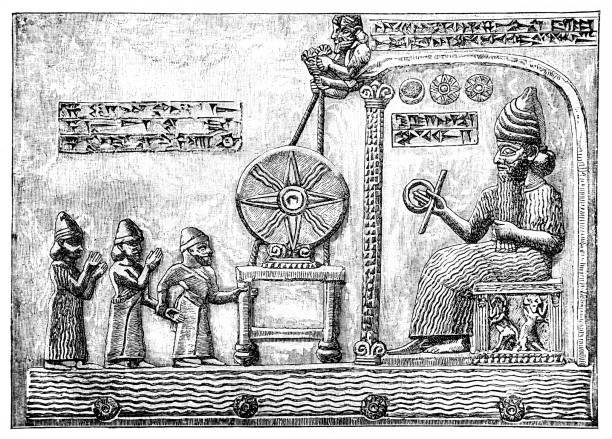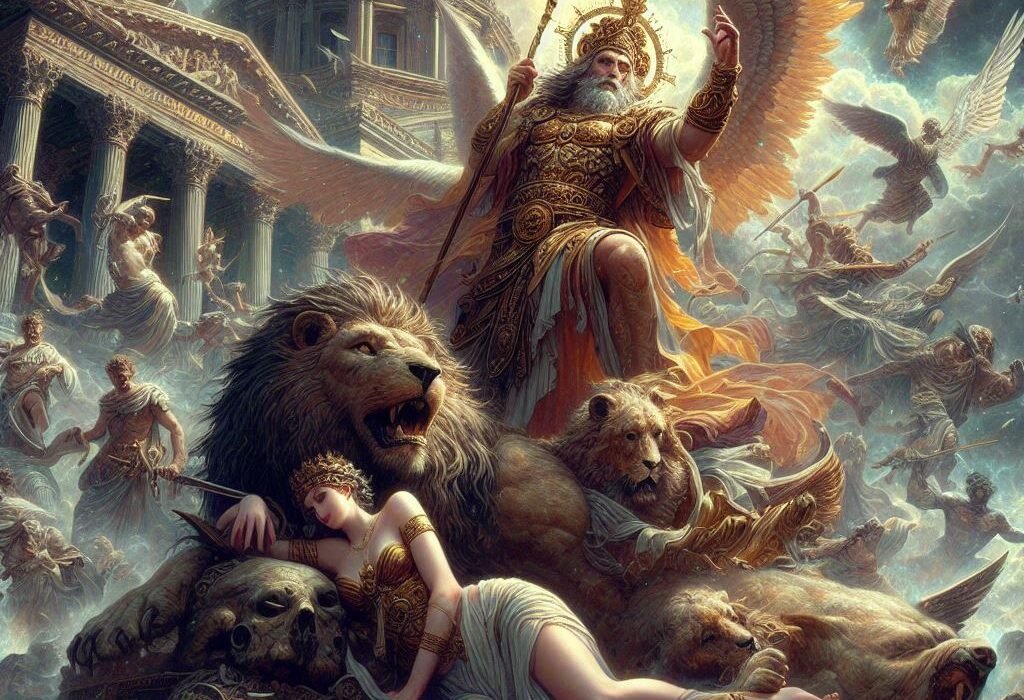Since the dawn of civilization, myths have told of mortals daring to stand against the heavens. These stories—etched in clay tablets, sung by poets, and carved into marble—echo with awe and terror, for they narrate a rare kind of bravery: that of mere humans who dared challenge the divine. To defy the gods was not simply rebellion—it was cosmic insubordination, often punished with madness, suffering, or death. And yet, these figures, be they demigods or mortals, chose defiance over submission.
This article is a journey into those immortal tales of mortal resistance—stories of legendary heroes who stood their ground, defied divine will, or even tricked the gods themselves. Some were punished, others rewarded, but all earned a place in the annals of myth as symbols of defiant spirit. Across Greek, Mesopotamian, Hindu, and Norse myths, we will discover what happens when human will meets godly power.
Prometheus: The Fire-Bringer Who Challenged Zeus
Among the earliest and most enduring stories of rebellion against divine authority is the tale of Prometheus, the Titan who defied Zeus himself. In ancient Greek myth, Prometheus was no ordinary god. He sympathized with humankind, and when Zeus decreed that fire—the divine spark—should be withheld from mortals, Prometheus disobeyed.
He stole fire from Olympus and gifted it to humans. This single act, so elemental and symbolic, changed everything. With fire, humanity could cook, forge weapons, warm their homes, and ignite civilization. Prometheus’s theft was not just a transgression; it was a declaration that mortals deserved progress, even against divine decree.
Zeus’s revenge was merciless. He chained Prometheus to a rock in the Caucasus Mountains, where an eagle tore at his liver daily. The liver, a regenerative organ in Greek thought, would regrow each night, ensuring endless torment. Yet Prometheus never begged. His silent endurance became a monument to resistance.
Later myths tell of Heracles (Hercules) eventually freeing Prometheus, but the legend remains a stark reminder of the price of defying divine authority—especially when it is done for the sake of others.
Gilgamesh: The King Who Defied the Limits of Mortality
From Mesopotamia’s ancient sands comes the Epic of Gilgamesh, a tale that predates Homer and rivals the Bible in its age. Gilgamesh, a king of Uruk and part divine himself, was a man tormented by the limits of human life. His rebellion was not against one god, but against the entire cosmic order that separated gods and mortals.
When his dearest companion Enkidu died—punished by the gods for helping Gilgamesh slay the divine Bull of Heaven—the king was shattered. He had challenged the gods and lost something dear. But his grief turned into obsession: he set out on an impossible quest to conquer death itself.
He sought Utnapishtim, the Mesopotamian Noah, who had been granted immortality by the gods. Gilgamesh demanded the secret of eternal life, but he was denied. Even when he found a plant that could restore youth, he failed to guard it, and a serpent stole it away.
Though Gilgamesh did not succeed in his quest, his defiance of the gods’ will—his refusal to accept death quietly—marked him as a hero. His epic ends not with immortality, but with wisdom: a realization that humans can leave a different kind of legacy.
Hercules: The Demigod Who Resented the Gods
Hercules (Heracles in Greek) was a son of Zeus and a mortal woman, which made him both divine and human. Yet his life was anything but divine. Hera, Zeus’s wife, hated him from birth and ensured he would suffer endlessly. Driven mad by her divine wrath, Hercules killed his own wife and children.
To atone, he performed the Twelve Labors—tasks so difficult that they bordered on the impossible. He faced the Nemean Lion, the Hydra, and the monstrous Cerberus. In completing these, he often had to defy the gods’ designs, steal from sacred places, and wrestle divine forces.
But Hercules’s true defiance came in his later life, when he became disillusioned with Olympus. After suffering betrayal, injustice, and manipulation by both mortals and gods, he grew weary of their politics. When his mortal body was consumed by a magical poison, Zeus tried to grant him a place among the gods. Hercules is said to have refused, for a time, to accept a seat among the very beings who had tormented him. In some versions, he ultimately ascends and becomes a god himself—but not before expressing contempt for their cruelty.
His defiance was not a single act, but a life-long resistance against the manipulation of gods who claimed to act in justice but often served their own pride.
Arjuna: The Warrior Who Questioned Divine War
In the Hindu epic, the Mahabharata, Arjuna stands as a warrior without peer, a prince destined to fight in a cataclysmic war. His defiance is subtle but no less profound: on the eve of battle, he lays down his weapons and refuses to fight.
This is not cowardice. Arjuna sees his family arrayed on both sides—the Kauravas and Pandavas, cousins and brothers—and asks, what is the point of war if it leads only to death, sorrow, and destruction?
It is here that Lord Krishna, his charioteer and an incarnation of the god Vishnu, reveals the Bhagavad Gita—a discourse on duty, righteousness, and the nature of the self. Arjuna’s defiance is philosophical. He questions the very foundations of divine law, even as the god himself stands beside him.
In the end, Arjuna fights—not as a servant of Krishna, but as one who understands and chooses his path with eyes open. His rebellion is not about slaying gods, but about demanding truth before obedience. He is a hero who insists that divine command must be met with reason, not blind allegiance.
Maui: The Trickster Who Snared the Sun
From Polynesian mythology comes Maui, a demigod and cultural hero renowned for his cunning. His feats are numerous: he fished up islands from the sea, invented fire, and brought humanity the secret of catching fish. But perhaps his greatest act of defiance was slowing down the sun.
In ancient times, the sun moved too quickly across the sky, and people had little time to work or gather food. So Maui crafted strong ropes, climbed the highest mountain, and waited for the sun god to rise. When it did, he snared it in his ropes and beat it into submission.
This was no minor trick. He defied the celestial cycle itself—rewriting the rules of day and night. The sun, though divine, had to yield to a mortal’s ingenuity.
Unlike Prometheus, Maui’s defiance was not punished with eternal torment. In many versions, the gods admire his cleverness. Maui represents a different kind of hero—the one who challenges gods not out of rage or despair, but with humor and brilliance.
Achilles: The Warrior Who Defied Fate Itself
In Homer’s Iliad, Achilles is the Greek’s greatest warrior, a man born to a divine mother and a mortal father. He knows his destiny: to die young but achieve eternal glory. Yet for much of the epic, he rejects this fate.
Achilles’s true defiance is not of gods, but of fate itself. When his pride is wounded, he withdraws from battle, even though the gods urge him to fight. When his friend Patroclus is killed, he returns—not for duty, but for revenge.
His wrath is legendary, and his scorn for the gods palpable. When Hector begs for proper burial, Achilles defies all divine and moral codes by dragging Hector’s body around the walls of Troy. Eventually, Zeus sends a message demanding that Achilles relent. He does—but not before asserting his independence from fate, tradition, and divine authority.
Achilles’s rebellion is existential. He embodies the tragic hero who knows his doom but walks into it with blazing defiance.
Odin: The God Who Defied the Cosmos
In Norse mythology, even the gods defy greater forces. Odin, the Allfather, is the chief god of the Aesir, but he is also a rebel against destiny. He sacrifices an eye to gain wisdom from Mimir’s well, and he hangs himself on Yggdrasil, the World Tree, pierced by his own spear, in a quest for knowledge of the runes.
Odin’s defiance is directed not at other gods, but at Fate itself—the Norns, who weave the destinies of all beings, including gods. Odin knows that Ragnarok, the doom of the gods, is inevitable. Yet he gathers warriors, studies magic, and seeks every hidden truth to delay or perhaps alter what is foretold.
He is a god who fights fate with the desperation of a mortal. His rebellion is not loud, but tireless and deep. In this sense, Odin is a hero among gods—one who chooses suffering and sacrifice in pursuit of a future that might be otherwise lost.
Sisyphus: The Trickster Who Cheated Death
The myth of Sisyphus is one of the most famous tales of divine punishment. A king known for his cunning, Sisyphus twice tricked death itself. When Thanatos came to claim him, Sisyphus chained him, stopping death across the world. When the gods sent Ares to free Thanatos, Sisyphus tricked Persephone into letting him return to the living.
But the gods always get the last word. Zeus condemned Sisyphus to roll a boulder up a hill for eternity, only to see it fall each time he neared the top.
And yet, Sisyphus remains a symbol of resistance. As the philosopher Albert Camus famously wrote, “The struggle itself toward the heights is enough to fill a man’s heart. One must imagine Sisyphus happy.” His rebellion, though crushed, remains defiant in its endless persistence.
Conclusion: The Enduring Flame of Defiance
What binds all these heroes across cultures—Prometheus, Gilgamesh, Arjuna, Maui, Achilles, and others—is not power, but courage. They dared question the divine order, challenge fate, or speak truth to celestial authority. Their acts were not always wise, nor their outcomes triumphant, but their stories endured because they reflect the most human of desires: the wish to choose.
To defy the gods is to claim agency in a world of giants. It is to be mortal, yet refuse to be small. In these legendary tales, we find echoes of our own struggles—against systems, injustice, and even death itself. That is why these heroes remain immortal. Not because they won, but because they dared.






